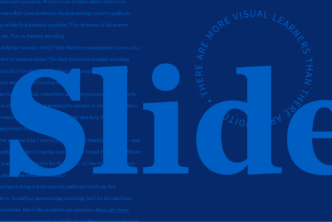Some time ago I went to church—I go to church regularly—and on this particular Sunday I did not have any responsibilities (i.e., I didn’t have to preach, I didn’t have to read the Scriptures). I had some friends who went with me. They were folks who, if you were taking a religious survey, would check “churchgoer occasionally.” One of these friends said that, when he and his wife go to church, they don’t like the music. They’re always singing the same old thing: “O Little Town of Bethlehem” or “Up from the Grave He Arose.” These were not regular attenders, but they went that Sunday with me.
Our pastor wasn’t there. A guest preacher—a professor at one of our Christian colleges—was to preach and he had obviously done his homework. He was preaching on 1 Peter 1 and he had done his work in the Greek. He took us through it and told us how important it was. When the sermon was over and we were going home, the folks wanted to be polite. They gave the kind of compliments that, for any pastor, are an insult. “I like the way he dressed. . . . He really is an intelligent, educated man.”
What happened was the sermon was all in 1 Peter. It was about the long-ago and far-away and it never made it into the twenty-first century.
Good sermons are nailed to the text. They are biblical. If we don’t preach the Bible, we have nothing to preach. If you want to preach politics, there are better people out there who can preach politics. If you want to preach psychology, there are better psychologists on television. But we can preach the Bible. The danger of preaching the Bible (if there is a danger) is that it’s all about the long-ago and far-away. So people hear sermons and they leave sitting in judgment on Abraham for going down to Egypt or upset with Jonah because he ran away from God and we never get to where the people in the pew are.
Good sermons live with that tension. They live with the tension of the Bible and they also live with the tension of being relevant to the folks who are listening. I’ve sometimes said that we don’t teach the Bible; we teach people the Bible. The task of preaching is not just to help people understand the biblical texts, as important as that is; it is to help people understand how the biblical text relates to them. Quite frankly, both of these deserve our attention.
I find that expository preachers often do not really ask, What’s the purpose of this sermon? What should it do in people’s lives? If you say, “Why are you preaching on Romans 5?” some preachers answer, “Well, because last week I was in Romans 4. Next week I’ll be in Romans 6.”[pullquote]we are not preaching to people about the Bible. We are preaching to people about them from the Bible.[/pullquote]
Until we have figured out why the passage would be important to people today—not just tell them that but show them that (e.g., How would it work in their business? How would it work in their homes? How does it work in their thinking?) as we bring the biblical text and the modern world together—we haven’t done our job.
So we are not preaching to people about the Bible. We are preaching to people about them from the Bible. And that means that there are two tensions: the tension of the biblical text (crucial, vital, and important) and the tension of the folks who are listening to us. Good preachers work hard to see to it that their sermons have that balance of biblical truth and contemporary relevance. That’s why being biblical and contemporary is the art of Christian communication.
***
This post is adapted from “Being biblical and contemporary is the art of Christian communication” by Haddon Robinson in Preaching Points: 55 Tips for Improving Your Pulpit Ministry, edited by Scott M. Gibson (Lexham Press, 2016).





